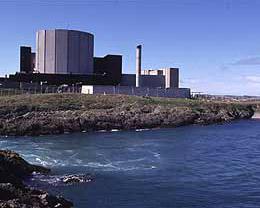
United Kingdom government plans to gerrymander the planning process will come in for criticism at the Celtic Leagues (Inter-Celtic) AGM involving delegates from the six Celtic countries in Dublin later this year.
The League has been a strident opponent of the United Kingdom nuclear industry and at its AGM in Brittany in 2006 it expressed concern about plans for a new generation of nuclear power stations.
The League were shocked to learn recently that the UK government is planning to bend planning rules to 'fast-track' nuclear power station planning applications. New nuclear plants are mooted for sites in Wales and North West England. It appears however that any attempt to utilise nuclear power plant sites in Scotland for new build will be opposed by the Scottish government.
Britain already accommodates a mountain of nuclear waste that the UK government is unable to deal with and the pollution legacy from the first fifty years of the nuclear industry is well documented.
The League meeting will be told that UK government plans to twist planning laws have already been pre-emptively criticised by the House of Commons (all-party) Environmental Audit Committee
A draft resolution to be considered by the League at its Dublin meeting is set out below - together with background detail:
'a) Views with concern comments by John Hutton MP, Secretary of State for Business, Enterprise & Regulatory Reform when referring to new-build nuclear power stations that; "ministers can help clear away the regulatory obstacles.'
'b) condemns any programme aimed at the so called fast-tracking of new nuclear power station planning applications.'
Background:
Safety and public accountability will be compromised if the United Kingdom introduces a faster planning and consents regime to underpin its new-build nuclear reactor programme.
The UK government has been under pressure to reform the planning inquiry system for nuclear stations for sometime from the nuclear lobby within the United Kingdom.
However we believe that if safety issues and economic justification are settled outside the current inquiry process potential dangers will arise and the ability of communities, interest groups and NGOs to have their voices heard in such processes will be compromised.
In 2006 the House of Commons (all-party) Environmental Audit Committee, commenting on the possibility of the scenario which has now arisen, concluded that moves to speed up the planning system would be controversial and risky. They said:
"It is difficult to see how the planning and consents process could be reduced below five years without a fundamental reform of regulatory and statutory procedures which might compromise both safety and public accountability,"....
"If the government wishes to reform the planning system, it must ensure that it does so, on a comprehensive and even-handed basis."....
"Several years ago the government proposed a new approach for major infrastructure projects of national significance, but abandoned it in the face of widespread opposition."
Related articles on Celtic News at:
(voir le site) (voir le site) (voir le site) (voir le site) (voir le site) (voir le site)
J B Moffatt Director of Information Celtic League
29/06/08
- Emmanuel Grégoire et l’abbé Macron par David Grosclaude le 23/11/2024
- Pays de Redon. La Bogue d’or, rendez-vous du « génie populaire » par Le blog de paul Molac le 05/11/2024
- Catherine Vautrin en Corse : Régions et Peuples Solidaires appelle l’Etat à enfin aboutir sur l'autonomie par RPS le 25/10/2024
- Gouvernement Barnier : des nominations inquiétantes par RPS le 24/09/2024
- Quelle future gouvernance en France ? par Marcel Berrou le 08/07/2024
- Après deux cycles de trois ans du Parlement de Bretagne réveillé, voici venir le troisième cycle ! par KAD le 01/07/2024
- Résolution pour la Réunification de la Bretagne à la XIXème Assemblée Générale de l'UNPO à Munich, les 11 et 12 mai 2024 : par KAD le 07/05/2024
- TER Nouvelle Aquitaine : quelle honte ! par David Grosclaude le 18/04/2024
- Les Braises de la Rencontre, le 5 mai 2024, sur le parc de sculptures mémorial de MAB Koad Sav Pell ! par MAB, Musée Archipel Breton le 16/04/2024
- Koun Breizh s’indigne : Non ! les festoù-noz ne sont pas des lieux réservés aux « attardés » ! par Koun Breizh - Bertaign Tenant - Mémoire-de-Bretagne le 07/01/2024
 The Celtic League has branches in the six Celtic Countries. It works to promote cooperation between these countries and campaigns on a broad range of political, cultural and environmental matters. It highlights human rights abuse, monitors all military activity and focuses on socio-economic issues.
TEL (UK) 01624 877918
MOBILE (UK)07624 491609
(voir le site)
The Celtic League has branches in the six Celtic Countries. It works to promote cooperation between these countries and campaigns on a broad range of political, cultural and environmental matters. It highlights human rights abuse, monitors all military activity and focuses on socio-economic issues.
TEL (UK) 01624 877918
MOBILE (UK)07624 491609
(voir le site)
